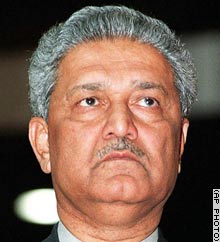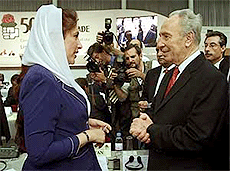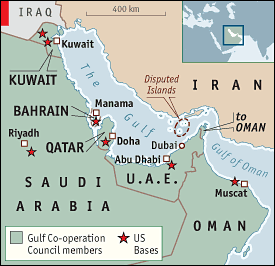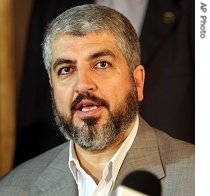“Israeli leaders paid tribute to slain Pakistani opposition leader Benazir Bhutto on Thursday, even though Israel and Pakistan do not have diplomatic ties. “I saw her as someone who could have served as a bridgehead to relations with that part of the Muslim world with whom our ties are naturally limited,” Prime Minister Ehud Olmert told The Jerusalem Post. He said the assassination was a “great tragedy,” and that he received the news “with deep sadness.” Upon her return to Pakistan two months ago, Bhutto had stopped in London and, through a mutual acquaintance, relayed a message that she would “in the future like to strengthen the ties between Israel and Pakistan,” Olmert said. President Shimon Peres said he was shocked by Bhutto’s killing…“ Click for full article
Archive for December, 2007
Olmert: ‘Bhutto could have been bridge to Muslims’
December 29, 2007General Kiyani: Most powerful man in Pakistan?
December 29, 2007An excellent article from The Guardian, arguing that head of the Pakistani army Gen. Ashfaq Kiyani has been strengthened in the wake of Bhutto’s assassination. In case Musharraf goes down in a helicopter “accident” in the coming months, Kiyani may yet succeed him and be the United States’ next man in Pakistan.
Loyal for now, Musharraf protege might yet turn on his benefactor
By Julian Borger(The Guardian) — Pakistan drifted deeper into turmoil yesterday with two men sharing the helm: the president, Pervez Musharraf, and the general he appointed to take his place at the head of the army, Ashfaq Kiyani.The ever-voluble Musharraf occupies centre stage in Islamabad but it is his tight-lipped protege who arguably holds more power in the crisis unfolding in the wake of Benazir Bhutto’s assassination.
When Musharraf tearfully handed over his chief of staff’s baton to Kiyani on November 28, he was not just surrendering his rank, he was also giving up his main political constituency, the army.
Musharraf insists his heart still belonged to the military, but it is not a sentimental organisation. Without attending general staff meetings, he can no longer wield direct control over the armed forces’ collective thoughts and actions.
Seeking a new source of legitimacy, Musharraf had hoped to strike a political bargain with Bhutto’s Pakistan Peoples party (PPP). But with Bhutto dead and the PPP in disarray, Kiyani could well be the stronger man. He leads Pakistan’s most powerful institution which, whether he embraces the role or not, makes him the country’s kingmaker.
Kiyani would not be the first chief of staff to oust the political leader who appointed him. Musharraf himself turned on his benefactor, Nawaz Sharif, the former prime minister who in turn is challenging Musharraf’s defiant hold on power.
Kiyani, the country’s former spymaster as head of its Inter-Services Intelligence agency, has so far shown no sign of biting the hand that feeds him. Yesterday his forces were deployed in the streets of Pakistan’s cities, facing down pro-PPP rioters on behalf of the government.
But Hasan-Askari Rizvi, a political analyst said Kiyani’s loyalty is not necessarily boundless. “The issue now is maintenance of law and order,” Rizvi said. “However, if the agitation becomes more intense and stays for a couple of weeks, then the army will no longer defend Musharraf and will make a decision as an autonomous entity.” The moment of truth need not be bloody. The army, Rizvi said, “could let Musharraf know that it can no longer defend the government and he has to resign. It will not be a coup. It will be polite advice.”
In his long military career, Kiyani has shown no appetite for politics. Unlike most of Pakistan’s past leaders, he is not drawn from the political elite but from a soldiering family in Punjab province, and rose through the ranks.
In 1988 he served as military secretary to Bhutto during her first spell as prime minister but he later impressed Musharraf who promoted him.
But Kiyani is not entirely dependent on his benefactor. He has strong links with Washington and his pro-American credentials were enhanced when he took an aggressive approach against religious extremists in Waziristan and Swat as the US had long demanded. If Washington eventually decides that Musharraf has become a liability, it knows who to call.
‘A new, younger jihadi threat emerges’
December 29, 2007(Christian Science Monitor) — “…The two women represent the leading edge of what security analysts and terrorism experts say is an emerging threat facing both Western and Arab countries: younger jihadis who have been recruited over the Internet or inspired to act through militant Islamist literature or videos. What’s more, analysts say, these young radicals often don’t belong to a centralized group and may even act on their own.
“As I speak, terrorists are methodically and intentionally targeting young people and children in this country. They are radicalizing, indoctrinating, and grooming young, vulnerable people to carry out acts of terrorism,” said Jonathan Evans, the director general of the British MI5, the security service, in November.
He warned that teenagers as young as 15 and 16 have been implicated in “terrorist-related” activities as a result of a deliberate strategy pursued by radical Islamist groups.
On Wednesday, Pakistani police arrested a 15-year-old boy for allegedly trying to blow himself up at a rally for opposition leader Benazir Bhutto, who was killed Thursday as she left an election rally in Rawalpindi, Pakistan. In September, a 15-year-old killed 30 people when he drove a truck full of explosives into an Algerian naval barracks.
And, in mid-November, the US declared that Omar Khadr, a Canadian national detained in Guantánamo Bay, was eligible for trial by a military commission, making him potentially the first minor to be tried for war crimes. He was arrested in Afghanistan when he was 15 and accused of killing a US soldier and conspiring with Osama bin Laden’s Al Qaeda network.
Analysts say this younger, more diverse, disparate, and more unpredictable crop of operatives is a prime recruiting pool for Al Qaeda’s off-shoots as the terror network becomes increasingly decentralized…“ Click for full article
Christmas in Lebanon 2007: Head of state tops country’s Christmas wish list
December 20, 2007One Lebanese President, and a partridge in a pear tree…
Head of state leads Lebanon’s Christmas list
By Ferry Biedermann in Beirut
(Financial Times ) — “What most Lebanese people want for Christmas is a president,” jokes a comedian dressed up as Santa Claus on the stage of an upmarket nightclub in a Christian suburb of Beirut. It is comedy night and the country’s convoluted political deadlock is an easy target for the performers. The audience seems to be grateful for every bit of comic relief. “We need to laugh because the situation is so tense,” says Antoine Geagea, who shares a last name with a leading Christian politician. The show must go on, even after the killing last week of François el-Hajj, a senior army general. “The bigger the mess, the more they need us,” says Fadi Riady, one of the comics. Lebanon’s parliament on Monday again postponed a vote on a new president, leaving the country without a head of state for more than three weeks. The new date is Saturday but after nine postponements few still believe the question will be settled this year...” Click for full article
Syria reportedly turned down offer from Khan nuclear network in 2001
December 20, 2007
(Photo of Pakistani rogue nuclear scientist Abdul Qadeer Khan, the most unprincipled man of the 20th century. AP Photo)
The timing of Syrian President Bashar al-Assad’s remarks is most bizarre. Why has Assad decided to bring up the nuclear issue, seemingly out of the blue, during an interview with the Austrian daily “Die Presse” just now? If Assad intended the interview to prove his country’s non-involvement in a secret nuclear weapons program despite being offered assistance by Pakistani rogue nuclear scientist Abdul Qadeer Khan’s black market network in 2001, why did we hear nothing of this during the storm of speculation about possible Syrian nuclear activity immediately following Israel’s strike (Operation Orchard) on an unknown facility deep inside the country? One possibility is that since both sides had maintained uncharacteristic secrecy about the details of the strike, Assad preferred to avoid addressing the issue head on, lest even mentioning Khan’s name in the same breath as his own country lead to more speculation. Another more likely possibility is that, against the background of immense political fallout from the release of the United States’ National Intelligence Estimate report on the Iranian nuclear program, Assad was emboldened to speak out against yet another case of unfounded American nuclear accusations with regard to his country. If this was Assad’s intention, he’d do well to know that his own statements in an interview with an Austrian daily won’t produce even a fraction of the fallout which resulted from the release of the NIE, with its conclusions backed by the 16 U.S. intelligence agencies. Those enigmatic Syrians…
(Associated Press) — “Syria received a letter purportedly written by the head of the same nuclear black market that supplied Iran and Libya with technology but did not respond, the country’s president said in comments published Wednesday. President Bashar Assad’s remarks to the Austrian daily “Die Presse” appeared to be the first time that a senior official linked the country to Abdul Qadeer Khan, the top Pakistani scientist who was exposed in 2004 as the head of an international black market in nuclear technology. Khan’s black market network was the key supplier of nuclear technology to both Iran and Libya. In the interview, Assad said that in early 2001, “someone brought a letter from a certain Khan,” adding, “we didn’t know whether the letter was real or a fake from the Israelis who wanted to entice us into a trap. “In any case, we turned it down,” he was quoted as saying. “We had no interest in nuclear weapons or a nuclear reactor. We never met with Khan…“ Click for full article
Relations Warm Between Iran and Gulf Arab Neighbors
December 20, 2007(The Economist) — “RELATIONS between Iran’s Shia revolutionaries and the rich, Sunni-dominated, American-protected Arabian monarchies of the Persian Gulf have never been easy. After America’s invasion of Iraq in 2003, and Iran’s election of the fire-breathing Mahmoud Ahmadinejad as president in 2005, they grew markedly worse. Arab fears of Iran’s regional ambitions, its influence over Shia minorities and its nuclear programme have lately been matched by Iranian worries about the loyalty of its own Arabs and the possibility of an attack launched from the American bases that speckle the opposite shore.
But recent events signal a possible change. On the same day on which a new American National Intelligence Estimate overturned previous assertions that Iran is actively pursuing nuclear weapons, President Ahmadinejad made a first-ever appearance as a guest at the annual summit of the Gulf Co-operation Council (GCC), a body created in 1981 largely with the goal of containing revolutionary Iran. Soon after the summit meeting, Saudi Arabia, the biggest by far of the GCC‘s six member states and long the most hostile to Iran, invited Mr Ahmadinejad to take part in the annual haj pilgrimage to Mecca. Another Arab heavyweight, Egypt, has also joined the charm offensive, sending its first high-level delegation to Iran in several years…“ Click for full article
Mashaal: Hamas ready to cede control
December 11, 2007“Damascus-based Hamas chief Khaled Mashaal confirmed that the Islamic group would return control of security and government institutions in Gaza to the Palestinian Authority, Asharq Alawsat reported on Tuesday…” Click for full article
Hamas officials have made some minor gestures and flirted with the idea of handing back the Gaza strip to PA control in the recent past, but, if Asharq Alawsat’s report is true, this seems to be the real thing as Khaled Mashaal, Hamas’ politburo chief based in Damascus, is a Hamas hardliner who many believe to be the one really in charge of the organization. He is also said to be the one behind that rash decision to takeover the Gaza strip last June.
‘Ahmadinejad calls US intelligence report a step forward’
December 11, 2007(Jerusalem Post) — President Mahmoud Ahmadinejad on Tuesday called a US intelligence review concluding Iran stopped developing its atomic weapons program four years ago a “step forward” and said more such steps could create an “entirely different” situation between the two countries. “We consider this measure by the US government a positive step. It is a step forward,” Ahmadinejad told a press conference.”If one or two other steps are taken, the issues we have in front of us will be entirely different and will lose their complexity, and the way will be open for the resolution of basic issues in the region and in dealings between the two sides,” Ahmadinejad said.
By “the resolution of basic issues in the region” he is of course referring to negotiations over Iraq — this story is a very big deal. It’s also the first utterance of a genuinely conciliatory remark Ahmadinejad has made to date. The NIE report is reaping fruit, at least in regards to Iraq, and strengthens the opinion of some analysts who say Iran’s main purpose in using the nuclear card was always to give it leverage over Iraq vis a vis the United States.
The List: The World’s Biggest Military Buildups
December 7, 2007“Since the end of the Cold War, most of the world’s militaries have downsized. But in recent years, a few countries have been bulking up. In this week’s List, FP (Foreign Policy) takes a look at the countries that are going large while everyone else is slimming down.“






